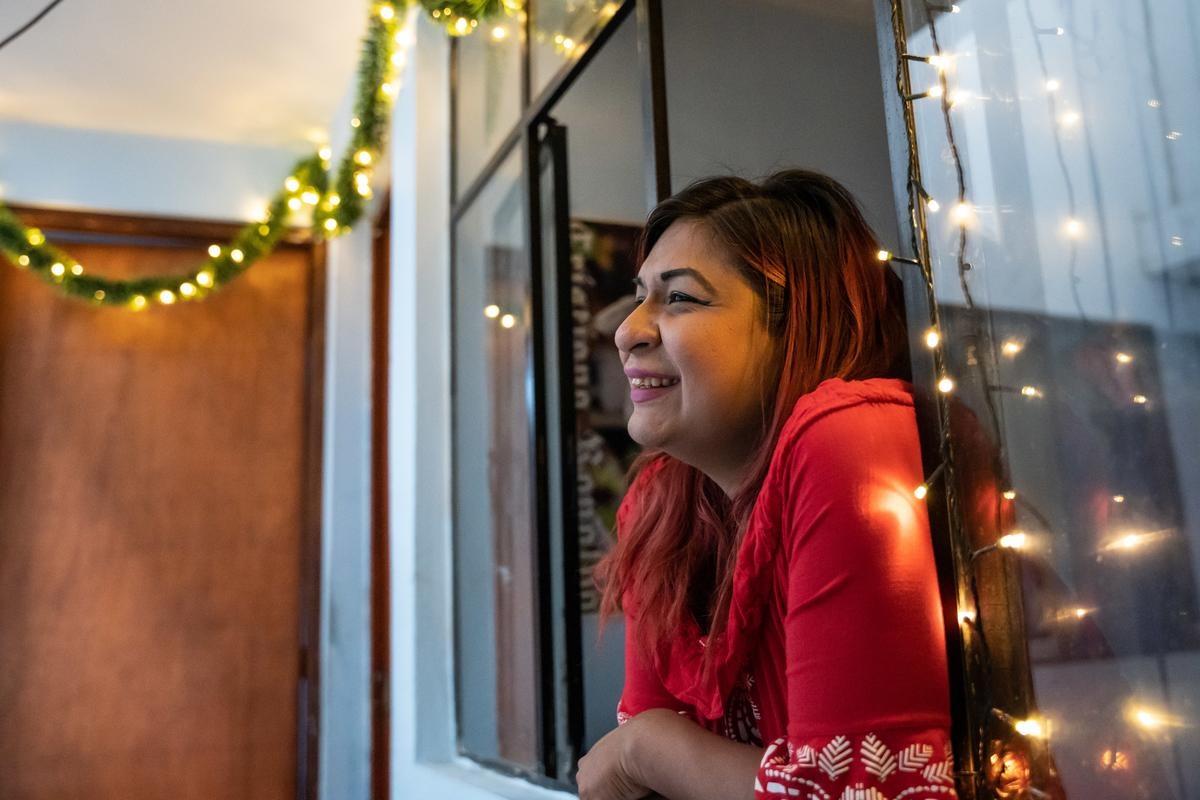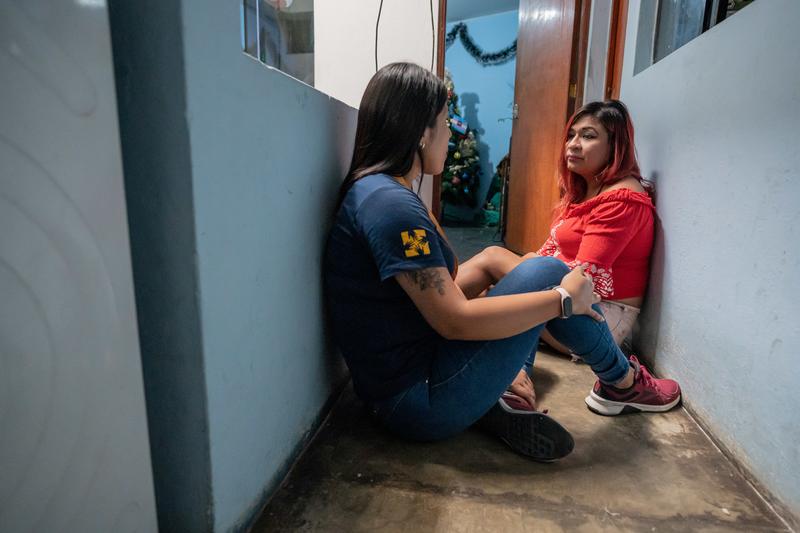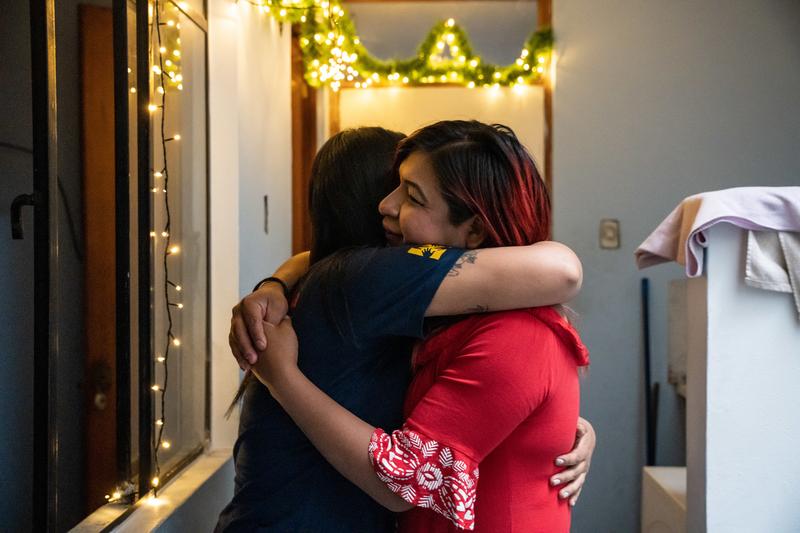Providing Free Therapy to Trans Women In Peru
In Lima, transgender women face daily threat of discrimination, violence
Posted on Feb 2, 2023

Content warning: This story relates to suicide.
As the clock struck midnight, Brenda Mijahuanca ate 12 grapes while sitting under the table, celebrating the new year and reflecting on her resolutions—a tradition in Spain and several Latin American countries.
She once didn’t know if she would make it this far.
2022 had been a year of struggle—as a transgender woman, as a sex worker, as a daughter disowned by family. And she was used to struggling alone. No one to call. No one to check on her. No one to care for her.
The struggles had compounded over the years, too. First, it was a nasty case of COVID-19. Then, debt and bouts of homelessness. Then, what felt like the unthinkable—an HIV diagnosis.
Month after month, Mijahuanca fell deeper into depression. Some days she didn’t want to take her pills, prescribed for HIV, tachycardia, and hypertension. Every day became a battle—and she felt like she was losing. The dark thoughts grew louder and all-consuming. She began to think about ending her life.
“At any moment, I could get very sad,” she recalls. “I felt like not existing and not living anymore.”
In August, she heard about a mobile health clinic run by Socios En Salud, as Partners In Health is known in Peru, where tuberculosis (TB) and HIV screenings were being offered free-of-charge. And these diseases weren’t the only ones addressed at the mobile clinic. There, Mijahuanca received a screening that revealed another health condition: depression.
A Silent Crisis
Depression affects 280 million people worldwide, including more than 1.7 million in Peru. It can cause a loss of interest in activities, poor concentration, feelings of low self-worth, hopelessness, and, in its most severe form, can lead to suicide. Although treatment exists for depression and other mental health conditions, 80% of Peruvians lack access to it.
Mental health conditions are especially prevalent among people who identify as transgender due to stigma, discrimination, and violence. On the streets of Lima, 86% of transgender women report having faced discrimination. And more than half have experienced domestic violence, according to a survey conducted by Socios En Salud and Féminas Peru in 2020.

Socios En Salud has worked in Peru since 1994, when it responded to a deadly outbreak of multidrug-resistant TB in Carabayllo. For decades, its mental health team has delivered care to patients—including transgender women—in Lima and beyond. Mental health care is integrated into care for maternal health, tuberculosis, chronic diseases, and more.
In 2021, the mental health team provided more than 146,000 screenings in Lima and Trujillo and more than 41,400 mental health consultations. The team also works closely with other programs at Socios En Salud, including JunTrans, formerly known as Féminas, which supports transgender women.
Mijahuanca was one of thousands of patients who accessed a mental health screening from Socios En Salud last year—opening the door for life-changing care.
A Care Plan
Just days later, Mijahuanca received a phone call from Socios En Salud Psychologist Dr. Maria Fernanda Amézquita Olivares, who wanted to learn more about her experience with depression as well as provide basic education about the condition.
Mijahuanca was anxious at first; but as Olivares continued speaking, she felt more at ease.
“Maria gave me a lot of confidence every minute that passed,” Mijahuanca recalls, “because she provided me a lot of security and support and I felt that she really wanted me to keep going.”
They set up a time for a weekly therapy session. Each session would be an hour; the therapy would last two months.
Socios En Salud also helped Mijahuanca access other forms of support, including a support group for transgender women, home visits by a community health worker, and essential resources such as food, which is one of several ways in which PIH provides social support.
Over the weeks, Mijahuanca’s progress was notable.
“The first time I talked to Brenda, she was showing signs of depression and a deep sadness,” says Olivares. “But in the last session, she was totally different—a more recovered personality, more animated, with a more hopeful vision… I feel very proud of Brenda.”

Mijahuanca feels proud of herself, too. The depression is still there, but it is more manageable. And things are looking up.
She finished paying off her debts. She has her own apartment, where she lives with her dog and cat. For emotional support, she leans on friends and her partner. And she turned 35 this year—a birthday that is beating the odds. Across Latin America, most transgender women don’t live past their 35th birthday.
As for new year’s resolutions, Mijahuanca has a few dreams she’s working towards, including one day opening her own bar.
“There were days where I only thought about no longer existing, I had no energy, and I didn’t feel like myself,” she says. “Now, I see myself. I am a girl who wants to get ahead by herself. I am an encouraging person. I like to motivate the people that I appreciate and love. I like to set goals and projects for my life.”
Accessing mental health care was critical to turning things around.
“I no longer lack energy, feel crestfallen, and I am no longer thinking about negative things,” she says. “If anyone is going through the same thing or something similar, without a doubt, I would tell them to seek help.”
If you or a loved one are experiencing suicidal thoughts or a mental health crisis, help is available. In Peru, call 113 (option 5). In the United States, call 988 for the Suicide & Crisis Lifeline.

